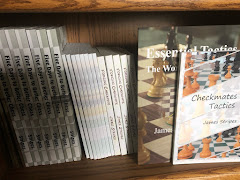The ChessBase database contains 110 games of Alexander McDonnell (1798-1835). He was described shortly after his death as "the best English player," although he was born in Belfast (see image). Of these games, 85 were played against a single opponent, Louis-Charles Mahé de La Bourdonnais (1795-1840). Their match, or rather series of six matches, was the first match between two masters in which the games were recorded and published.
| Title Page from Walker (click on image to emlarge) |
As near as I have verified so far, the games in the ChessBase database are sequenced in the same order as this book. However, game 14 is not in Walker's text. Rather, he offers, "The Fourteenth game is not preserved, it was not a good game" (155).
Chess Skills blog is following this historic match that took place 180 years ago. I am studying the games with some reference to databases, limited reference to the comments of other players, and no reference to engine evaluations. My analysis certainly contains errors. My principle goal is personal training in tactics, strategy, and analytic skill. This personal study journal, however, may be of interest to other chess enthusiasts. Indeed, comments posted on some of my previous posts confirms that it is.
There is a very good book on this historic match: Cary Utterberg, De la Bourdonnais versus McDonnell, 1834 (2005). Utterberg offers a narrative of the historical milieu, a compendium of comments on the games by other chess writers, and his own analysis. Of particular interest, perhaps, is Utterberg's summation of the state of opening theory when the match took place. Unfortunately, I do not have a copy of Utterberg's book, but base my understanding of its contents and merits upon Utterberg's website and reviews o which it links. Utterberg's own critique of certain errors in the text, which was published as a ChessCafe article ("Errata and Punishment") serves to convince me of his skills as an historian.
My post, "Morning Coffee," contains my analysis of game 13. My series on the match begins with "Three Fighting Draws." Each post on this match contains a link to the next in the series. At my current pace, it will require many months longer than I anticipated when I determined to work through all of McDonnell's game. I may well own a copy of Utterberg's book before I finish.
According to Walker, the first match consisted of 21 games. Draws did not count towards this total. There were four draws in the first match.
McDonnell,Alexander -- De Labourdonnais,Louis Charles Mahe [B21]*
London m1 London (14), 1834
1.e4 c5 2.f4 e6 3.Nf3 d5 4.e5 Nc6 5.c3 f6 6.Na3 Nh6 7.Nc2 Qb6 8.d4 Bd7
Bourdonnais makes small refinements to his opening play.
White to move
9.Ne3
McDonnell continues to repeat errors that brought pain in previous games. This move weakens d4.
9.Bd3 0–0–0 10.0–0 Be8 11.Qe1 c4 12.Be2 Bg6 13.Ne3 Nf5 14.b3 cxb3 15.axb3 Qxb3 16.Bd1 Qb6 17.exf6 gxf6 18.Ng4 Bg7 19.Qxe6+ Kb8 20.Nxf6 Ncxd4 21.Nxd4 Bxf6 22.Qxb6 axb6 ½–½ Prosviriakov,V (2307)--Rozanov,P (2304) Moscow 2013
9...cxd4 10.cxd4 Bb4+ 11.Kf2
I commented on this king hike in "De La Bourdonnais Evens the Score."
11.Bd2 also leads to the loss of a pawn. 11...Nxd4 12.Nxd4 Qxd4 13.Bxb4 Qxb4+ 14.Qd2 Qxd2+ 15.Kxd2 0–0
11...0–0 12.Kg3 fxe5 13.fxe5
To McDonnell's credit, however, he is not yet down a pawn. Perhaps, he considered his own refinements an improvement.
13...Be8
The bishop aims at h5 and thence f3. Black increases the pressure on d4.
White to move
14.Kh3
14.b3 seems worse 14...Bc3 15.Rb1 and d4 will fall.
14.a3 offers prospects of securing White's center 14...Be7 15.b4 Bh5 16.Bb2 Bxf3 17.gxf3
14...Bh5 15.g4 Bg6 16.Bg2 Be4
When the knight on f3 disappears, the d-pawn will fall.
17.g5 Nf5 18.Nxf5 Rxf5 19.Be3
The d4 pawn gains another protector.
19...Bxf3 20.Bxf3
Black to move
20...Nxe5
The knight was also protecting e5.
21.Bg4
21.dxe5 Qxe3 22.Rf1 Raf8 23.Kg2 Rxg5+ 24.Kh1 Black's advantage seems clear.
21...Nxg4 22.Qxg4 Raf8 23.Rhg1 Bd6
White to move
24.Bc1
24.Raf1 is worse 24...Rxf1 25.Qxe6+ Kh8 26.Rxf1 Rxf1
24.Rg3 seems to be Whiute's most stubborn reply 24...Bxg3 25.hxg3 Qxb2 26.Rg1
24...Rf3+ 25.Kh4
25.Rg3 Bxg3 26.hxg3 Rf1
25...R8f4 0–1
McDonnell went on to lose the next four games before finally winning a long battle. See "That Pin of f7" for game 15.
*In "Two Losses" I noted that C00 should be the ECO code. In fact, one of the games with this opening appears in the Encyclopedia of Chess Openings at that code. The B21 that appears is preserved as I find it in the ChessBase database.


















No comments:
Post a Comment